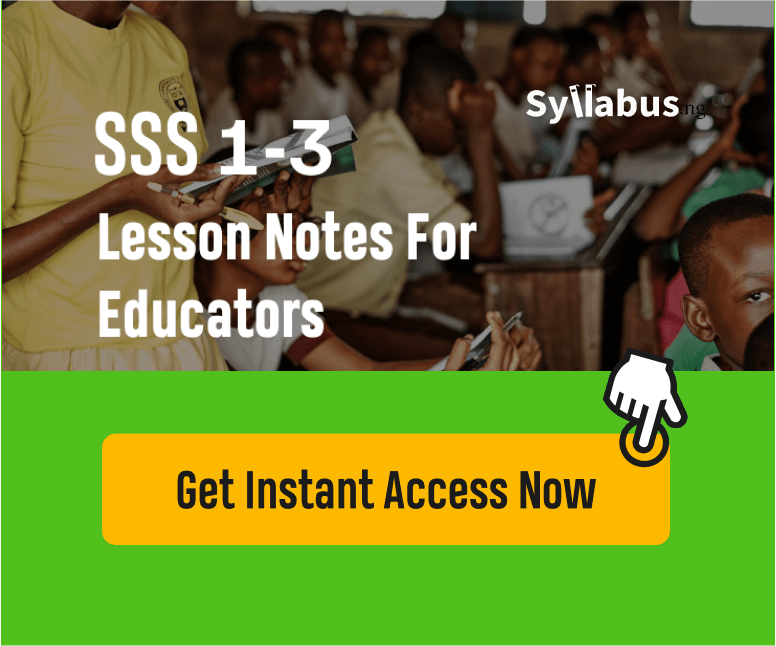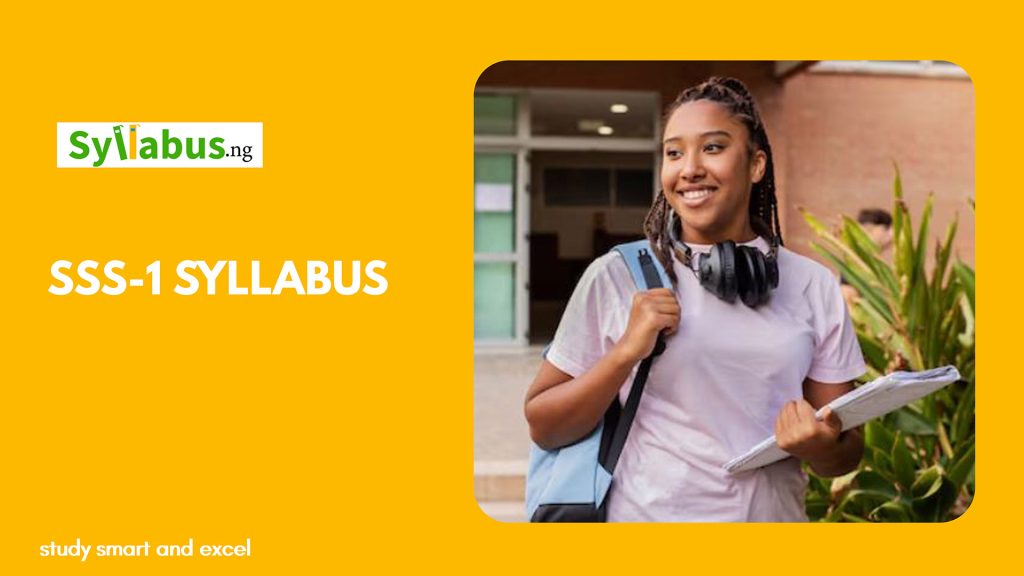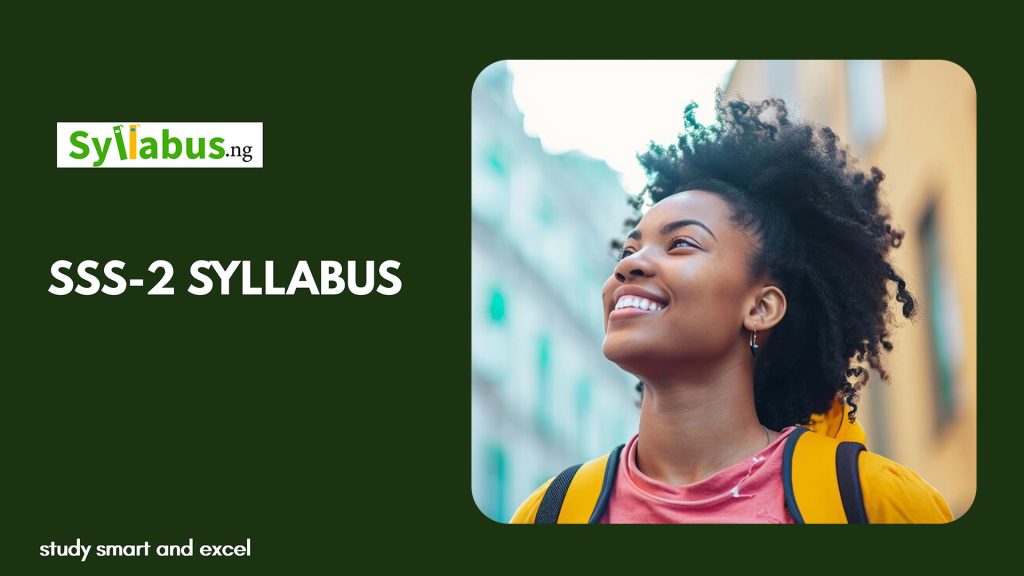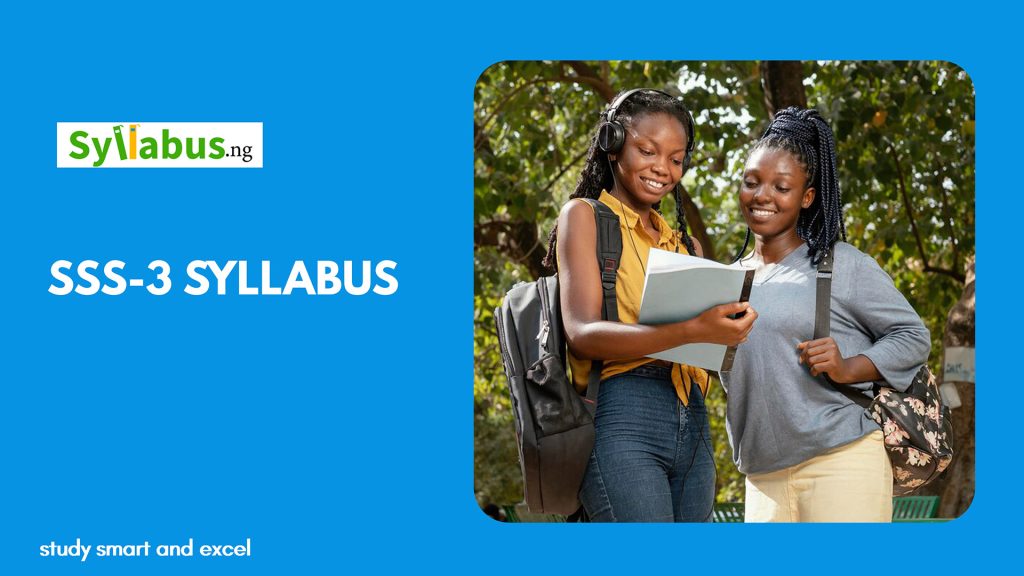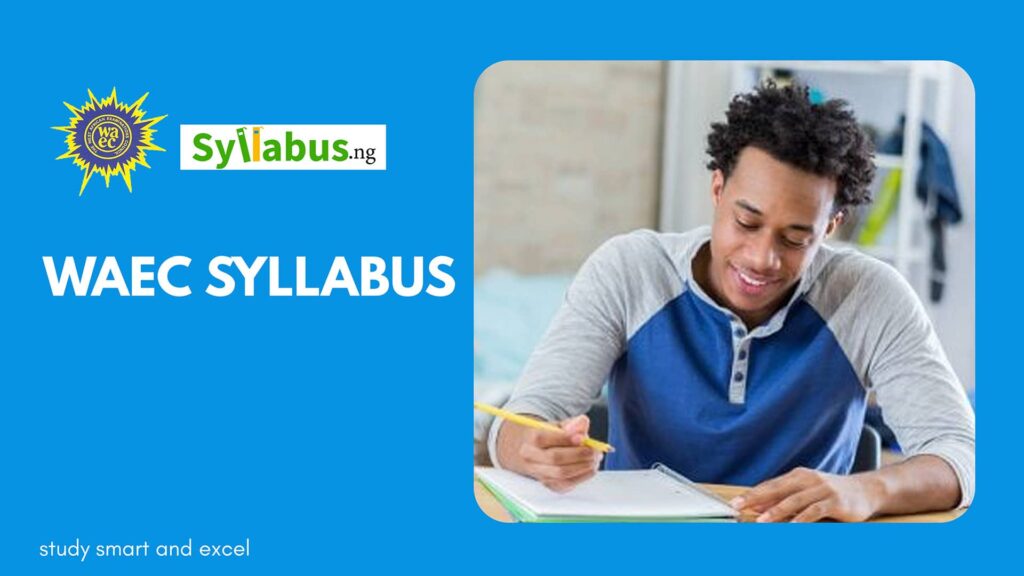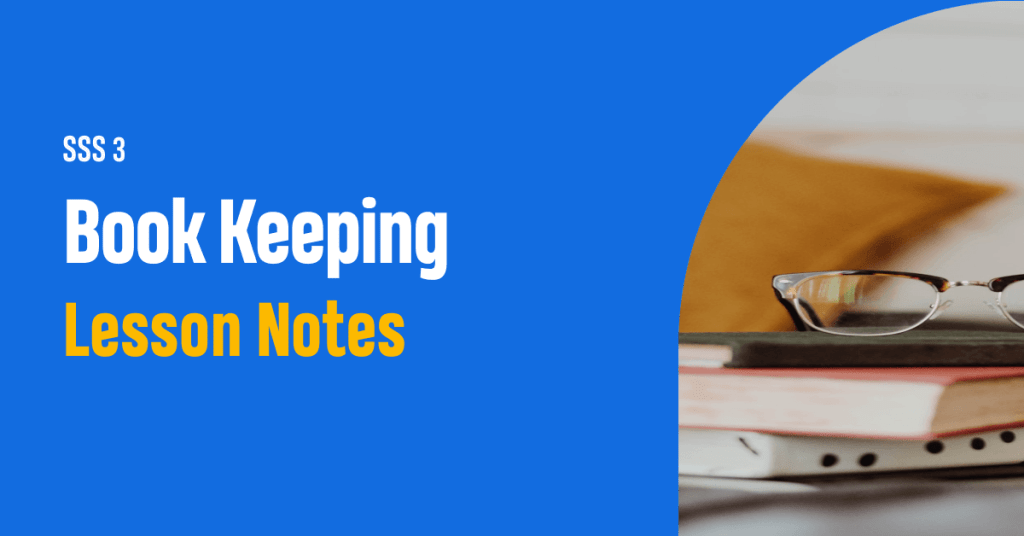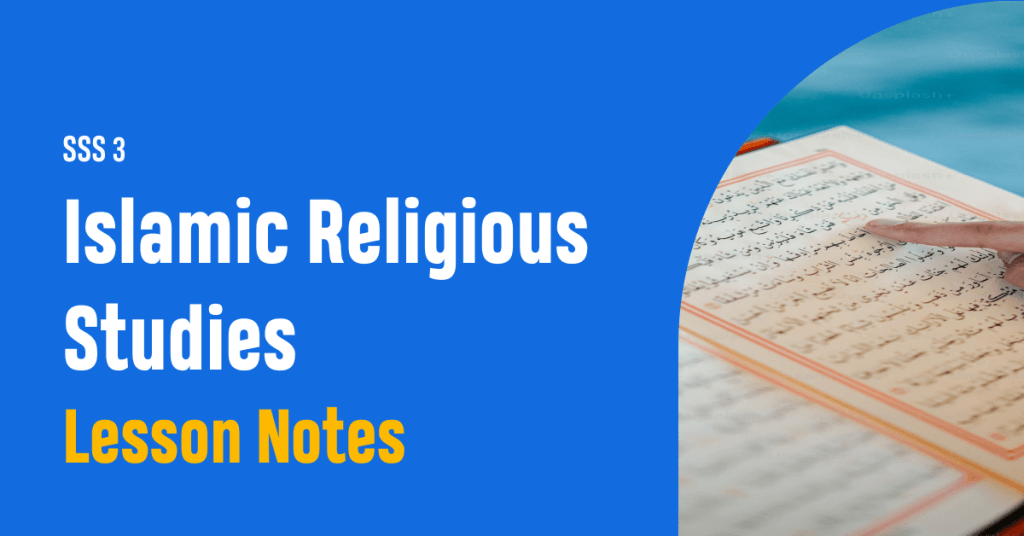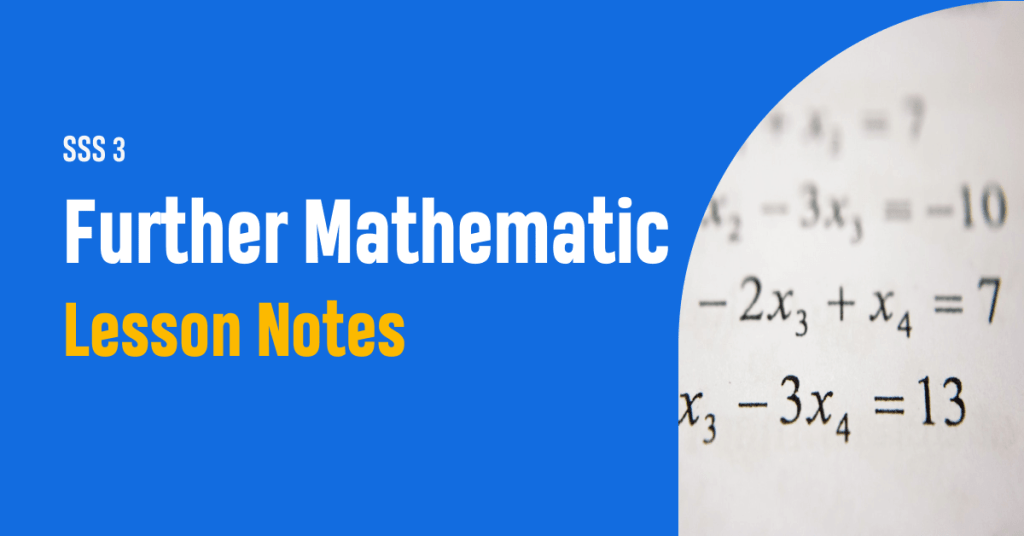SSS3 English Studies Scheme of Work
Download the Senior Secondary School 3 (SSS3) Unified Scheme of Work for English Studies to serve as a guide for educators

Home » SSS3 Scheme of Work » SSS3 English Language Scheme of Work
Home » SSS3 Scheme of Work » SSS3 English Language Scheme of WorkAbout SSS3 English Studies Scheme of Work
As the concluding year of senior secondary education, SSS3 is a time for students to solidify their knowledge and prepare for the West African Senior School Certificate Examination (WASSCE). Proficiency in English is essential not only for achieving high marks in WASSCE but also for getting into a tertiary institution.
The importance of English Studies is immense. Since English is the medium of instruction across various subjects, students’ ability to understand and express concepts clearly is critical. This skill is fundamental for addressing the diverse range of questions in WASSCE, which includes literature analysis, essay writing, and comprehension tasks. Additionally, strong English skills enhance students’ critical thinking and communication capabilities, which are vital in higher education and the professional world.
The Lagos state unified scheme of work for SSS3 English Studies is extensive, aiming to sharpen students’ reading, writing, listening, and speaking abilities. Through thorough practice and interaction with different types of texts, students gain a deeper appreciation for language intricacies, literary techniques, and effective communication methods. This well-rounded preparation ensures that students are ready to perform exceptionally well in WASSCE, setting the stage for their future academic and career endeavors.
Assessment Guide
SSS3 students in Nigeria are assessed in the English Language through continuous assessments and the WASSCE. Continuous assessments include class tests, assignments, oral presentations, projects, and class participation. The WASSCE consists of multiple-choice questions, essay writing, comprehension, summary writing, and oral English tests. These assessments evaluate a range of skills, ensuring holistic evaluation, skill development, preparation for higher education and careers, and identification of areas for improvement.
Get SSS3 English Language Lesson Notes

Never bother about writing lesson notes again. Get our well written SSS 3 English Language lesson notes for (First, Second & Third Term).
Its’s printable, in PDF Format, editable, and easy to use.
SSS3 First Term Scheme of Work for English Studies
| LAGOS STATE MINISTRY OF EDUCATION: UNIFIED SCHEMES OF WORK FOR SENIOR SECONDARY SCHOOLS | ||
| English Language Scheme of Work for Senior Secondary Schools 3(SSS3) | ||
| Class | S.S.S 3 | |
| Subject | English Language | |
| Term | First Term | |
| Week | Topic | Breakdown |
| 1&2 | Words associated with culture, institutions and ceremonies (Vocabulary Development) | Words associated with culture: 1. Ceremonies: a. child naming b. festival c. rituals d. chieftaincy e. title taking f. chieftaincy affairs and installation etc. 2. Institutions: a. social norms b. social morality c. native customs d. social class e. marriage f. family life etc. 3. Other Age groups, African arts, sculpture, lyrics. |
| SPOKEN ENGLISH Revision of sentence intonation pattern | 1. Falling tone e.g. statements a. The students are working hard b. Muazu will be here soon c. Rose is a beautiful girl. 2. Rising tone e.g. Yes/No – questions a. Is this your book? b. Did you see them? c. Is the story true? | |
| GRAMMATICAL STRUCTURES Revising Nouns and noun phrases | Nouns Noun Phrases. 1. Types of nouns a. Common nouns b. Proper nouns c. Collective nouns d. Abstract nouns 2. Plural forms a. Regular plural formation e.g. Book – books Cat – cats Tree – trees | |
| Writing Revising continues writing (in given topic and length) (400 words) | Expository composition reflecting current issues e.g. 1. Describe how external. examinations are conduced in the country. This should not be more than 400 words. 2. Election in this country Nigeria 3. Loss of lives through plan crash. 4. An excursion to Abuja . 5. Drug abuse 6. Corruption in the society | |
| Reading silently to answer questions (COMPREHENSION) | 1. Silent reading of materials that are topical e.g. a. Population explosion. b. Youth unemployment. c. Youth restiveness (disadvantages). d. Being your brother’s keeper e. The evils of examination malpractice. f. Acquiring properties illegally as a National malaise. 2. Discussion of selected topics including telling the meaning of words in context. 3. Answering questions that cover all levels of difficulty. | |
| 3 | SUMMARY WRITING 1. Summarizing a Talk/Lecture | 1. A talk on any of these topics: health – (HIV/AIDS) social studies (Population and family life) corruption, environmental issues, values orientation etc. 2. Relevant questions that bring points and ideas. |
| SPOKEN ENGLISH Words with clusters of two consonants occurring in the final position | Words ending in two consonants such as: sports, banks, sacks, bags, task, trinkets, thrusts, exist, subsist etc. | |
| VOCABULARY DEVELOPMENT Words associated with Motor Vehicles | Words associated with parts of a vehicle: Chassis, Chassis, number, bonnet, trafficators, rear lights, side lights, carburetor, radiator, fuel gauge, windscreen, wiper, alternator, etc | |
| GRAMMATICAL STRUCTURES Revising Pronouns and their uses. | 1. Definition of pronoun. 2. Types of pronoun e.g. personal pronouns, possessive pronouns, reflexive pronouns etc. 3. Explanation of types of pronoun. 4. Uses e.g. who, whom, he/she can be used instead of names of people. | |
| 4 | SPOKEN ENGLISH 3. Words with clusters of three and four consonants occurring at the final position | 1. Words ending in three consonants such as: Ants, exists, scripts, crafts, twelfth etc. 2. Words ending in four consonants as sixths, twelfths, prompts, tempts, glimpsed etc. |
| LISTENING FOR COMPREHENSION 1. Listening to reproduce main points and ideas in a speech | 1. Tape recorded speech. 2. Radio broadcast. 3. Selected passages on speech writing. | |
| Revising verbs and verb phrases | 1. Passages on the market highlighting the part of speech – verb. 2. Making sentences with verbs e.g. save, talk, work, receive, etc. 3. Phrasal verbs like: abide by, adhere to, away with, etc. | |
| VOCABULARY DEVELOPMENT Differentiating between British and American Spellings of common words | Selected aspects of difference between: 1. American use of ‘or’ for British ‘our’ as in: American – Color British – Colour American – Honor British – Honour 2. American use er) an British (re) as in Theater – Theatre Center – Centre 3. American use of s) for British (c) as in: offense – offence defense – defence | |
| GRAMMATICAL STRUCTURES Revising verbs and verb phrases | ||
| 5 | COMPREHENSION 1. Reading silently to answer questions | 1. Silent reading of materials that are topical e.g. i. Youth unemployment in the county. 2. Discussion of selected topics including telling the meaning of words in context. 3. Answering questions that cover all levels of difficulty. |
| VOCABULARY DEVELOPMENT 2. Words Associated with Traveling | Words associated with traveling by road, highway, dual carriage way, petrol pump, toil bridge, speed, brake, road side, mechanic, towing van etc. | |
| 2. Revising Letter writing (in given topic and length) 400 words informal letter | 1. Letter writing (not more than 400 words). 2. Informal letter format. a. One address b. Salutation c. Body of the letter d. Closing | |
| SPOKEN ENGLISH 4. The schwa /ə/ as final unstressed syllable | The schwa /ə/ as final unstressed syllable – /ə/ e.g. daughter, enter, sister, teacher, mother, etc. | |
| 6 | LISTENING FOR COMPREHENSION 6. Listening to direction and following them accurately | 1. A passage indicating directions e.g. a. Directions to places like school, market, hospital, fuel station or any other popular place. b. Direction on how to perform certain task. 2 Paragraphs describing locations and directions to places. 3. Examples of appropriate words, phrases such as ‘round the corner’, ‘turn right’, ‘turn left’, ‘move forward’, ‘close’ etc |
| READING Paraphrasing Prose | 1. Suitably constructed prose passages from text books. 2. Materials from other subjects e.g. science, Agriculture, Bible knowledge etc. that students can paraphrase. | |
| GRAMMATICAL STRUCTURES 3. Revising verbs and verb phrases | 1. Passages on: a. place of worship 2. Making sentences with words like, pray, listen, clap, preaching, sing, read etc. | |
| VOCABULARY DEVELOPMENT 8. Collocations | 1. A range of words or expressions which are combined and used in idiomatic ways e.g. a. The politicians used his loyalists to achieve his whims and caprices whims and caprices collocate). b. He swallowed the idea whole and sinker. (whole and sinker collocate). 2. A passage containing collocations. | |
| 7 | COMPREHENSION 1. Reading silently to answer questions | 1. Silent reading of materials on Disadvantage of Youth Restiveness. 2. Discussion of the selected topic including explanation of some words in the passage. 3. Answering questions that cover all levels of difficulty. |
| WRITING 2. Revising formal letter writing | 1. Formal letter writing not move than 400 words 2. Formal letter a. Conventional forms of two addresses b. Opening/salutation c. Heading d. Body of the letter e. Closing f. Signature | |
| SPOKEN ENGLISH Reading aloud confidently | Suitable passages for reading. a. Stories from story books. b. Extracts from Newspapers and Magazines. | |
| VOCABULARY DEVELOPMENT Foreign elements in English usage French words. | A range of words taken from French language and commonly used in English language. Examples are attaché, ala carte, cognette, corps, femme fatale, genre, couver, petit, vis-à-vis, bourgeoisie, précis finesse, fracas, coup detat etc. | |
| 8 | GRAMMATICAL STRUCTURES 4. Revising Sequence of Tenses | 1. Present tense. When the main verb is in the present tense, verbs in subordinate clauses will be present e.g. He sees that he has made a mistake. 2. Past Tense when the main verb of a sentence is in the past, verbs in subordinate clauses must be in past tense e.g. we saw that he had made a mistake. |
| LISTENING FOR COMPREHENSION Listening to lectures and taking notes | 1. A lecture on any of these topical areas – health, social studies, environmental issues or any other school subject 2. Guide to note – taking from lectures and speeches. 3. Listening for key words that signal a new point. – First, second etc. – In addition. | |
| SUMMARY WRITING Reading and summarizing expository passages | 1. Selected passages on contemporary issues. 2. Presentation of passages on the following diseases. a. HIV/AIDS b. Malaria fever c. Typhoid fever | |
| 9 | WRITING Revising formal letter writing | Same as in week 7 |
| GRAMMATICAL STRUCTURES Reviving verbs and verb phrases | 1. Passages on our environment. 2. Highlighting the verbs in the passage 3. Making sentences with verbs and phrases relating to our environment. | |
| SPOKEN ENGLISH Engaging in a meaningful dialogue on a given subject matter | 1. Selected passages on current issues e.g. a. Drug abuse b. Child abuse c. Examination malpractice 2. Core values e.g. a. Honesty b. Right attitude to work c. Discipline | |
| READING Reading and making notes. | Reading and making notes on selected passages on contemporary issues. a. Economic and financial crime commission (EFCC) | |
| 10 | VOCABULARY DEVELOPMENT Words associated with science and technology | 1. A passage on: a. science and technology b. ICT i. information ii. communication 2. Consistency of suitable range of words in common use. 3. Words such as microcomputer, data processor, computerize energizer etc. 4. Molecular, nucleus, gene, hereditary, Niger – SAT, x-ray, intra-rays, incubator, radio – waves, antenna, aerial, digital, global system of mobile communication (GSM) digital recorder etc. |
| GRAMMATICAL STRUCTURES Modals forms and uses | 1. Forms of modals 2. Uses of modals e.g. a. Must/have to (obligatory) e.g. i. I must look after my father. ii. I have to look after my father. b. Can/able to ability) e.g. i. He can still read even at eighty. ii. He is able to read even at eighty c. Will/would (intention) e.g. i. The president will visit Ilorin next week. | |
| SUMMARY WRITING Summarizing a talk/lecture | Same as in week 3 | |
| COMPREHENSION Reading silently to answer questions | 1. Silent reading of materials on: – the events of examination malpractice. 2. Discussion of selected topics including telling the meaning of words in context. 3. Answering questions that cover all levels of difficulty | |
| 11 | REVISION | |
| 12 | EXAMINATION | |
SSS3 Second Term Scheme of Work for English Studies
| Term | Second Term | |
| Week | Topic | Breakdown |
| 1&2 | VOCABULARY DEVELOPMENT Words associated with government and Administration | 1. Words associated with Government selected of written passages containing such words as democracy, democratic, national policy, revenue, white paper, official gazette, agency etc. 2. Administration, administrative structure, bureaucracy, cadre, circular, permanent secretary, memorandum, agenda, minutes, official rank etc. |
| SPOKEN ENGLISH 7. Reading and appreciating poetry | 1. Selected poems from Nigerian poets. 2. Poems from the student’s textbooks. 3. Poems from their poetry books. | |
| LISTENING FOR COMPREHENSION Following Arguments Efficiently | 1. Selected argumentative passages based on health, gender, environmental issues, population family life and social issues e.g. “Women are better doctors than men”. “Farming is more important than teaching”. 2. Emphasis on: a. Intention of the writer. b. Central idea of the passage. c. Factors responsible for certain situations d. Reasons given by the speaker to support or oppose a view. e. Reasons, effects or results of a particular thing f. Advantages or disadvantages of an idea. | |
| WRITING Writing for different audiences a. The Teacher, the Headmaster b. Newspaper /Magazines etc. | 1. Types of letter 2. Formats of semi-formal and formal letters. | |
| 3 | GRAMMATICAL STRUCTURES Adjuncts forms and functions | 1. Different forms and functions of adjuncts. 2. Clauses of time, place, manners, comparison, result e.g. a. He came when his son passed his examination time). b. He saw where his father was born. Place) c. He danced as well as the girl did (comparison). d. He worked so hard that he passed with flying colours (result). e. As he walked lazily down the street, he met his friend (manner). 3. Implications of position for meaning where attention is drawn to the manners, it provides a change in rhythm for example: i. “Quickly, he ran to his side”, as opposed to: ii. “He ran to his side quickly”. |
| READING Paraphrasing Dramatic works | 1. Suitably constructed work on drama. 2. Drama from popular radio and television. programmes. 3. Drama written by any Nigerian playwright. | |
| SPOKEN ENGLISH Arguing given topics effectively | 1. Selected expository and argumentative passages. 2. Argument on core values e.g. a. Justice b. Contentment c. Courage d. Regard and concern for the interest of others. | |
| LISTENING FOR COMPREHENSION Paraphrasing poems listened to. | 1. Carefully selected poems of varying degrees of complexity. 2. Poems written by both Nigerian and foreign poets e.g. Keats’s Odes, Shakespeare’s sonnet, Coleridge’s the rime of ancient marina, J.P. Clark’s casualtives, L. Senghor’s poems, Soyinka’s poems etc. | |
| 4 | READING Reading to summarize by outlining main points | 1. Silent reading of materials on topics of current national concern e.g. a. The evils, of fake and adulterated drugs. b. There is dignity in handwork c. Tolerance makes for peace and harmony. d. Corruption destroys the fabric of society. e. Destroys the environment, destroy the future of our children etc. 2. Discussion of selected passage including new and key words. 3. The meaning of topic sentences and where to find them in a paragraph. 4. Qualities of a good paragraph 5. Summarizing a reading selection n effectively. |
| VOCABULARY DEVELOPMENT Words associated with foreign elements in English usage – Latin and Greek words | Words of Latin and Greek origin. 1. Latin ad hoc, alter, ad infinitum, alumnus, ego, alumni, fefacto, de jure, gratis, locus standi, vox populi, prorate, ultra vires, subjudice, bonafied. 2. Greek Catharsis, colossus, draconian, laconic. | |
| WRITING Revising continuous writing (in given length) | Expository composition reflecting current issues e.g. – Drug Abuse – Corruption in the society. | |
| 5 | GRAMMATICAL STRUCTURE Revising Adjectival Clauses | 1. What adjectival clauses are e.g. That is the house which Adaeze built. 2. Functions of adjectival clauses. 3. Identification of adjectival clauses in passages. |
| LISTENING FOR COMPREHENSION Paraphrasing Poetry | 1. Carefully selected poems of varying degrees of complexity. 2. Famous poems e.g. .stanzas from: a. Keats Odes b. Shakespeare’s sonnet. c. Coleridge’s the rime of the ancient marina. | |
| VOCABULARY DEVELOPMENT Words associated with Law and Order | Passages featuring registers related to: 1. Law and order e.g. Police force, plaintiff, civil defense, mobile police, defendant t, court summon, prosecutor, tribunals etc. 2. Social order social justice, local customs, societal norms, human rights, good citizenship, population explosion, and population control, civil rights. | |
| WRITING Writing for different audiences b. Newspaper Magazines etc. | 1. Types of letter 2. formats of semi – formal and formal letters. | |
| 6 | GRAMMATICAL STRUCTURES Revising Complex sentences | 1. Combination of both embedded and in depended clauses. 2. There are sentences which are combinations of the two type’s e.g. – The book which was on the table was taken away by the chief but he could not sell it 3. There are two connectors in the sentence in no .2, one indicating an embedded clause and the other showing that an independent clause follows. Another example is “He caught up with the thief who had stolen his purse and hurt him in the process”. |
| WRITING Revising report writing (in varying length) | 1. Types of report e.g. official and private reports. 2. Examples of reports e.g. An accident which happened near you and which you watched very closely. 3. The report of proceedings of a meeting e.g. a. Class meeting b. Debating society c. Press club 4. Guidelines for writing a report. | |
| COMPREHENSION Reading silently to answer questions. | 1. Silent reading of materials that are topical e.g. e. Being your brother’s keeper. f. Acquiring properties illegally as a national malaise. 2. Discussion of selected topics including telling the meaning of words in context. 3. Answering questions that cover all levels of difficulty. | |
| 7 | VOCABULARY DEVELOPMENT Idioms and Idiomatic Expression | 1. A wide range of phrases and sentences with form of idiomatic expressions 2. Passages displaying use of idiomatic expressions. Attention should be given to such expressions as: a. He can not give his family on square meal a day. b. He is the black sheep in the family C. He studied hard and got the golden fleece d. He was born with a silver spoon in his mouth e. Life is not a bed of roses f. He is living in a fools paradise g. I shall take the bull by the horn, when the time comes h. He is a jack of all trades |
| LISTENING FOR COMPREHENSION Listening to instructions and following them. | 1. A passage or a pre-recorded speech giving instructions on certain tasks e.g. instructions on how to take care of one’s health, environment, home, school etc. 2. Selected words, phrases used in giving instructions e.g. do, lift, wash, remove from, proceed to etc. | |
| READING FOR COMPREHENSION Reading and summarizing argumentative passages | Argumentative passages. 1. Simple reports for summary. 2. Materials bearing arguments on contemporary issues e.g. “Has science done more harm than good to our lives”. | |
| 8 | GRAMMATICAL STRUCTURES Revising Adverbial Clauses | 1. Passages on: a. may computer b. our culture c. human rights d. indiscipline highlighting adverbials 2. Adverbial e.g. a. Causes and reason “because” b. Purpose e.g. “so that” c. Condition e.g. If d. Contrast e.g. “Although”. |
| WRITING Revising report writing | Same as in week 6 | |
| LISTENING FOR COMPREHENSION Listening to dramatic presentations and identifying the themes and story lines. | 1. Drama with particular attention to: a. theme b. the story line c. feature of a play 2. Carefully selected plays by both Nigerian and foreign playwrights. | |
| 9 | REVISION | |
| 10 | EXAMINATION |
Get SSS3 English Language Lesson Notes

Never bother about writing lesson notes again. Get our well written SSS 3 English Language lesson notes for (First, Second & Third Term).
Its’s printable, in PDF Format, editable, and easy to use.
Recommended English Studies Textbooks for Senior Secondary School 3
The recommended English Studies textbooks for SSS3 include but are not limited to the following:
- High Standard English for Senior Secondary Schools by
Gabriel A. et al. – Spectrum publishers
- Advanced Learner’s Dictionary
- English At a Sitting by O. Olanrewaju
Excellent Scholars publishers
- Understanding Oral English for Schools and Colleges by Emeke Modesty
- Understanding English Grammar for Schools and Colleges by Obiazikwor
- Daily Mastery of Mathematics and English by Ariyo S.O. & Aremu B. – Joytal Prints

